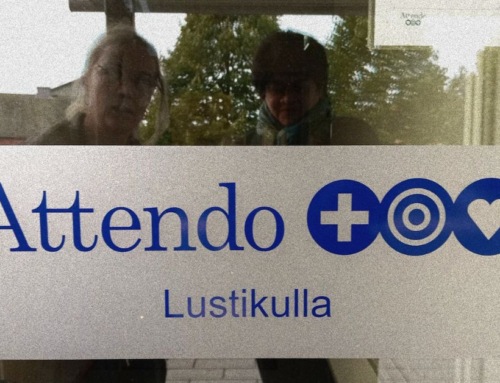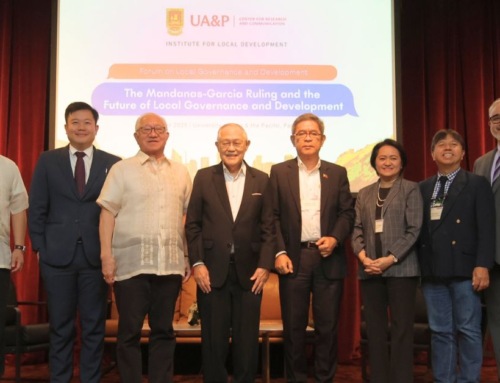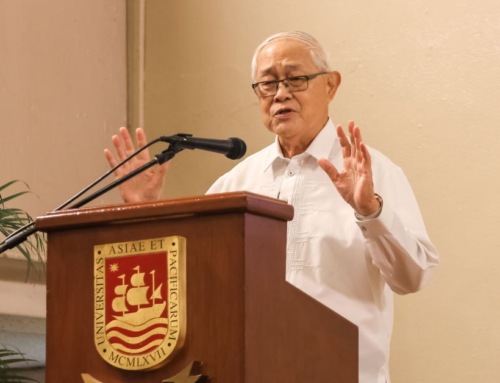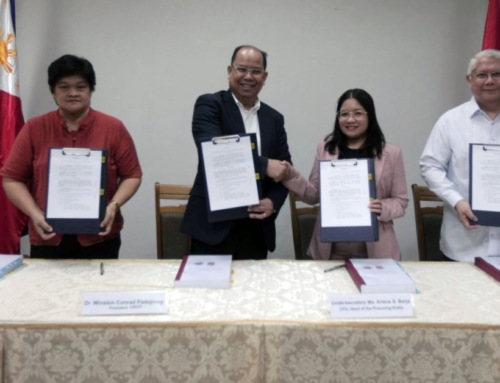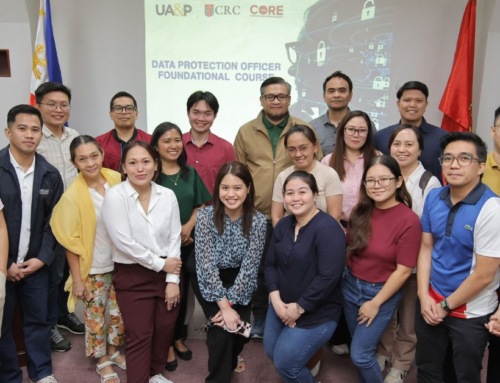
A recent study conducted by Dr. Veronica Ramirez, Associate Professor of the University of Asia and the Pacific, was presented at the First National Symposium on Brain & Mental Health Research, “Breaking Stigmas in Mental Health through Research and Development.” It was held on April 11, 2024 at the Philippine International Convention Center and organized by the Department of Science and Technology (DOST) Philippine Council for Health Research and Development (PCHRD) headed by Exec. Dir. Dr. Jaime Montoya and Dr. Sarah Jane Jimenez.
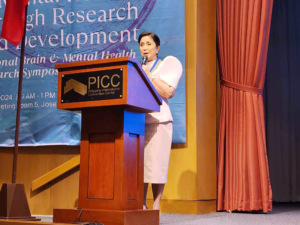
Atty. Maria Leonor “Leni” Robredo speaking at the National Brain & Mental Health Research Symposium of the Department of Science and Technology (DOST) forum on April 11
Dr. Ramirez’ talk was entitled, “Safe ka ba Sis? Filipino Migrant Workers and their Mental Health Needs”. The Keynote message was given by Atty. Maria Leonor “Leni” Robredo, who talked about strengthening mental health advocacy, harnessing private and public partnership to enhance research to policy implementation. Among the speakers in the symposium were Dr. Lourdes Bernadette Tanchanco, Director of the Ateneo Center for Research and Innovation, Ms. Teresita Panganiban, President and CEO of FriendlyCare Foundation, Inc.
The Ramirez research highlighted the need for accessible mental health services and culturally sensitive support for Overseas Filipino Workers (OFWs). She found that there are different levels of mental disorder, such as disruptive and assaultive behavior, or had full blown episodes, mild mental health problems, anxiety disorder, schizophrenia, depression, and a few suicide cases. In addition, there is culture shock and work-related circumstances that may trigger mental health problems among OFWs.
The stressors of mental health problems were also identified. These are the pressure to provide for their families, coupled with financial burdens like loans and the need to send remittances, which can lead to overwhelming feelings of despair for many OFWs. Social stigma surrounding mental health issues further prevents them from seeking help. Difficulty adjusting to a new language, culture, and living conditions can also contribute to isolation and anxiety. Despite these challenges, OFWs have developed coping mechanisms such as maintaining a positive attitude, relying on social support and religious faith, or resorting to self-medication and alternative medicine.
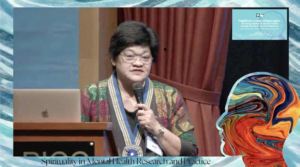
Dr. Veronica Ramirez speaking at the National Brain & Mental Health Research Symposium of the Department of Science and Technology (DOST) forum on April 11
The study calls for a multifaceted approach to tackle mental health issues among OFWs. This includes making mental health services accessible and affordable, with options like teleconsultation and culturally sensitive support systems. Educational campaigns are crucial to combat stigma and normalize seeking professional help. Pre-deployment assessments with a psychosocial focus can identify potential mental health risks. Empowering OFWs through workshops and resources on psychosocial issues is also important. Finally, strengthening family support networks is vital for their overall well-being.
By implementing these recommendations, the Philippines can ensure the mental well-being of OFWs who play a significant role in the country’s economy. The mental health of Filipino migrant workers deserves programs that can address their needs. By addressing the, providing accessible support systems, and fostering a culture of mental well-being, OFWs can be stronger in facing the challenges at pre-deployment, employment and return stages. More importantly, the psychosocial well-being of this vital workforce can be ensured.
———————————————————–———————————————————–—————————–——————
Learn more about CRC’s contributions in Migration and Overseas Filipino Work. In this field, CRC has brought about in-depth insight into the lives of the millions Filipino migrant workers whose contributions make a sizeable chunk of the Philippine economy – from their education and recruitment in the Philippines to their concerns and life strategies while working overseas, to their successful reintegration upon returning to the country.
The Bank of the Philippine Islands (BPI) Foundation, Inc., established the BPI Professorial Chair for Migration and Overseas Filipino Work (MOFW) on February 3, 2014. For years, the holder of the professorial chair has been undertaking intensive research on migration and development to guide policy makers, and publish teaching resource materials on the integration of migration into the K-12 Basic Education Curriculum subjects.
To find out more about CRC, send an email to [email protected], or message +639054280727, or follow us on LinkedIn. You can also find us on Facebook.

